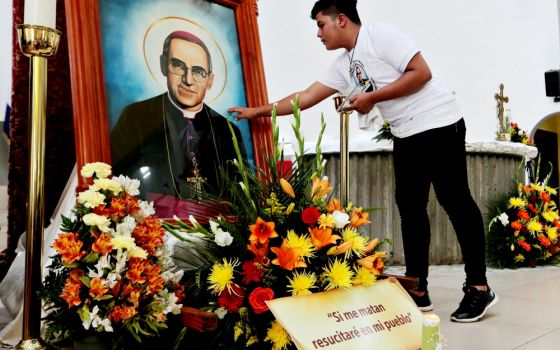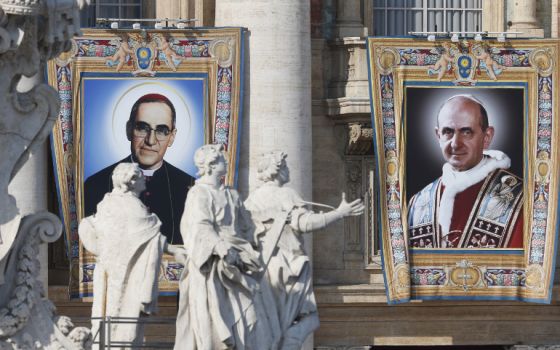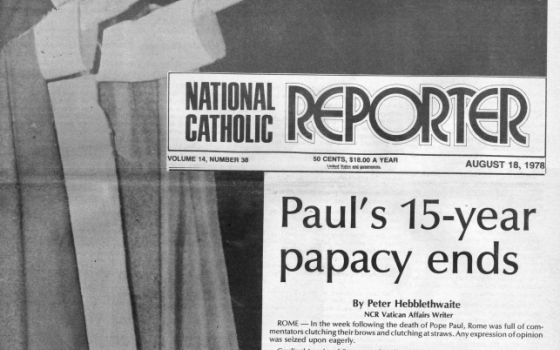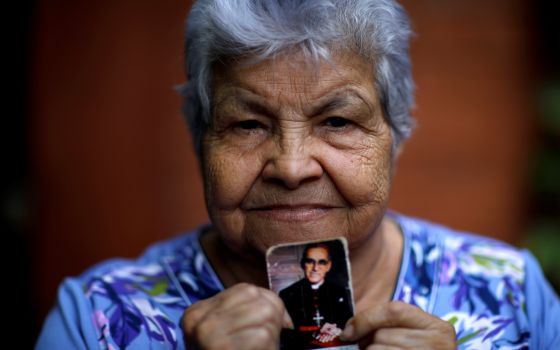
Cardinal Gregorio Rosa Chavez of San Salvador, El Salvador, takes a selfie with young people March 16 during the 2018 Religious Education Congress at the Anaheim (Calif.) Convention Center. He concelebrated a mass and gave two talks during the March 16-18 congress, sponsored by the Archdiocese of Los Angeles Office of Religious Education. The annual event drew more than 40,000 Catholics from throughout California and the United States. (CNS/Victor Aleman, Angelus News)
El Salvador's Cardinal Gregorio Rosa Chavez called the upcoming canonization of Blessed Oscar Romero a "gift from God" and is optimistic it can bring hope to his troubled homeland and to the Catholic Church.
At a meeting March 6 with Cardinal Angelo Amato, prefect of the Congregation for Saints' Causes, Pope Francis formally signed the decree recognizing the miracle needed to advance the sainthood cause of the slain archbishop of San Salvador, who was martyred for the faith.
No date or place has been announced yet for canonization ceremony, but Rosa Chavez said the bishops of El Salvador had sent a letter to the pope asking if the canonization could take place in El Salvador "so that the poor could participate."
The cardinal, who is auxiliary bishop of San Salvador, was interviewed in Los Angeles by Pablo Kay of Angelus News, the archdiocesan news site. The prelate was invited to this year's Religious Education Congress in Anaheim. The March 16-18 congress is sponsored by the Archdiocese of Los Angeles Office of Religious Education.
Upon arriving in Los Angeles, Rosa Chavez visited schoolchildren and celebrated Mass at St. Thomas the Apostle Church in Pico-Union, a parish with a large Salvadoran community.
Then he headed to the Congress, where he concelebrated a Mass and hosted two workshops titled "Justice Isn't Enough: Forgiveness Is Necessary" and "Why Is Our Holy Father Named Francis? A Christian Reflection on Peace."
During a wide-ranging interview he talked about the Romero canonization and the second miracle confirmed by the Vatican to move the cause forward; shared his thoughts on immigration and U.S. President Donald Trump's push for a border wall; and described a "hurricane named Francis," meaning the pope and all he has done during his five years as pontiff.
Asked how people should prepare for Romero's canonization, he said: "This question is so important that we (the bishops of El Salvador) discussed it with the pope when we met with him last March because there was an attitude that his canonization was like having won the lottery. But this is a gift from God, and now this gift has to be merited.
"The pope gave us three ways to prepare," Rosa Chavez said. "First, by getting to know Archbishop Romero. Many have never read his homilies. Second, by following his example. Third, by learning to invoke his intercession, to pray to him. We're learning to do this."
He said that there is "a different atmosphere" in El Salvador, knowing that the canonization is "imminent" and beyond the preparation, he feels this will help "achieve peace in the country."
"The country can do things that are impossible," Rosa Chavez said. "We're the country of impossible things, a country of surprises that can rise from the ashes, that can make peace possible — with Romero at the front. ... Now, we're all in 'Romero mode,' as they say."
The cardinal said he was invited to the Religious Education Congress long before the pope marked this fifth anniversary and of course before the announcement that Romero will be canonized.
The prelate was glad both happenings occurred shortly before the congress, because he saw being in Los Angeles as a chance to talk about Romero and also "to help people know who this Francis really is, this hurricane named Francis."
Rosa Chavez also said he spent time with the family of the woman whose cure from a life-threatening condition was credited to the intercession of Romero and verified as the miracle needed for his canonization.
New reports in El Salvador said that a woman named Cecilia, who had had several difficult pregnancies, had problems with her latest pregnancy, in August 2015. After she gave birth, she was diagnosed with HELLP syndrome, a life-threatening condition that affects some pregnant women and damages the liver.
"HELLP" stands for the three main features of the syndrome: hemolysis, elevated liver enzymes and low platelet count.
Cecilia's husband was told her liver and a kidney were damaged. "If you believe in something," the doctor said, "in a god, (pray) for her because the way she is, it's likely that she'll die."
Rosa Chavez recounted reports of how the husband went home to pray, opened a Bible his grandmother had given him, saw a card with Romero's image in it, and even though he'd had an "aversion" to his grandmother's prayers to the slain Salvadoran archbishop, he prayed for his intercession.
Though Cecilia had slipped into a coma, she awoke Sept. 10 and made a full recovery, the newspaper said.
"The case of this woman is really amazing," Rosa Chavez told Angelus News. "I was able to spend a few hours with her family."
He said that as the husband prayed to Romero, about 40 members of the Neocatechumenal Way community to which Celicia belonged "began to pray this same prayer."
Advertisement
The doctors had no solution for her case and "the best they could do was induce her into a coma, to give her body as much rest as possible," the cardinal said. "All of a sudden, this woman begins to react, and the doctors don't know what's going on. These doctors kept a very detailed record of her condition during this time — something like a thousand pages — which were sent to Rome along with all the tests they performed on her."
He added: "This woman suddenly recovered as if nothing had happened to her. When I see her now with her child, so full of life, and when she talks … it's hard to believe she was ever sick! This was a miracle of life."
Asked if he prays for the late archbishop's intercession, Rosa Chavez replied: "I remember the first time that I prayed to him after he was beatified, I felt like I was conversing with the same person I had known, the one I had walked together with so many times."
Rosa Chavez commented on proposals and feedback the youth of El Salvador have sent to Pope Francis in advance of the October world Synod of Bishops on youth, faith and vocational discernment.
"The greatest danger that they named was social media," he said. "The youth of El Salvador! In the document, they describe how today's youth are captivated by this new technology that they can't master, and they end up being enslaved by it."
"To these young people, the threat of violence practically came in second place," he added, referring to the gang violence that is a daily reality for many. "A kid can't go down the street to even see his girlfriend, because the gang members are there," he noted.
With regard to today's technology and young people, he said: "Pope Francis has referred to how Jesus loved to share with his disciples around a table, but also with those that the world despised: the sinners, the poor. But what happens today? The youth have lost this sense of 'conviviality.' The people don't share — they get on their little gadgets, and they become absent. So, the pope says, these people are connected, but not communicated."
He also talked about the Catholic Church's role on immigration, thanking Los Angeles Archbishop Jose Gomez "for his courage and his clarity on this issue, as well as the U.S. bishops."
"After a long time of Latinos being marginalized in this country, the strength and rich heritage of Latinos has been discovered by the Church because the world realizes that the future, in large part, depends on us," he said.
He criticized Trump's idea for a border wall, noting the pope talks about building bridges.
"There are too many walls between people. I think that if the people around him (Trump) can convince him to build bridges, the issue is solved," he added.






